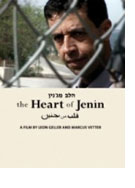

Opening 7 May 2009
Directed by:
Leon Geller
Writing credits:
Leon Geller, Marcus Vetter
We see: a city morgue, a corpse transferred to an ambulance, two ambulances meeting at a border: Haifa, Israel, and Jenin, Palestine. We hear how twelve-year-old Ahmed Khatibs, while on an errand for his mother, met two friends. They were playing “war” games when Israeli soldiers mistook his plastic gun for real and shot him. Jenin, in the West Bank, is a political tinderbox.
Re-wind: to the hospital in Haifa where Ismael Khatibs learns his son was brain-dead. A male nurse talks to Ismael about donating his son’s organs; he phones his wife Abla, they concur to do this, although initially Ismael declined donating his son’s heart. Six organs are donated to children who had little chance at survival.
Two years later, Ismael wants to meet the children. We travel north into the hills where Ismael visits the teen Samah and her Druze family, south into the desert where the young Bedouin Mohammed energetically plays, then to Jerusalem for the difficult visit. Menuha’s ultra-orthodox Jewish parents were grateful that an organ became available that saved their little girl’s life, but struggle with the knowledge it came from a Palestinian.
Written and directed by Leon Geller and Marcus Vetter, the film strikes a sensitive balance with the region’s political situation, various religions and the human aspect. The story’s structure combines past, present and discretionally-used archival footage, imbued by Erez Koskas’ original music. It gives us insight into the personal ramifications for the Khatibs and the organ recipients’ families, against the precarious situation in which they live. Annoyingly, the white subtitles (in a region with blinding sun and desert) were hard if not impossible to read. (Marinell Haegelin)